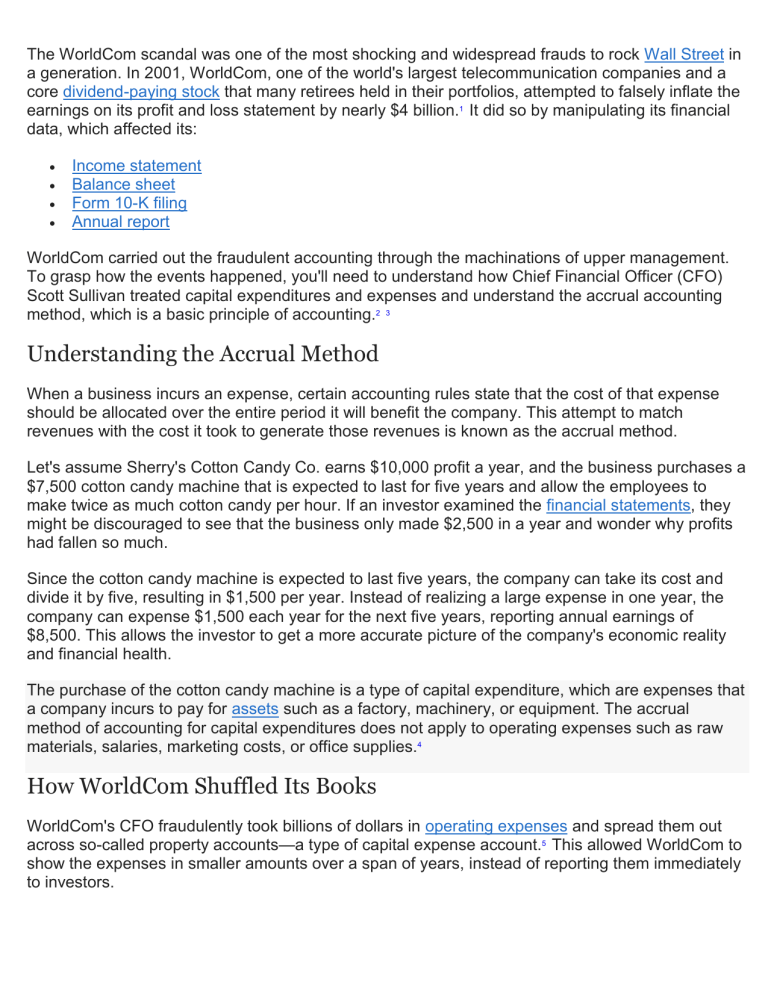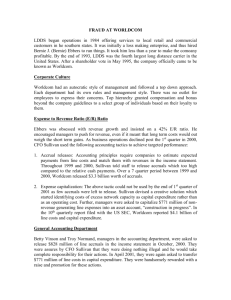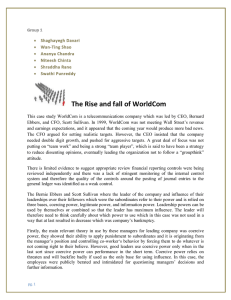
The WorldCom scandal was one of the most shocking and widespread frauds to rock Wall Street in a generation. In 2001, WorldCom, one of the world's largest telecommunication companies and a core dividend-paying stock that many retirees held in their portfolios, attempted to falsely inflate the earnings on its profit and loss statement by nearly $4 billion.1 It did so by manipulating its financial data, which affected its: Income statement Balance sheet Form 10-K filing Annual report WorldCom carried out the fraudulent accounting through the machinations of upper management. To grasp how the events happened, you'll need to understand how Chief Financial Officer (CFO) Scott Sullivan treated capital expenditures and expenses and understand the accrual accounting method, which is a basic principle of accounting.2 3 Understanding the Accrual Method When a business incurs an expense, certain accounting rules state that the cost of that expense should be allocated over the entire period it will benefit the company. This attempt to match revenues with the cost it took to generate those revenues is known as the accrual method. Let's assume Sherry's Cotton Candy Co. earns $10,000 profit a year, and the business purchases a $7,500 cotton candy machine that is expected to last for five years and allow the employees to make twice as much cotton candy per hour. If an investor examined the financial statements, they might be discouraged to see that the business only made $2,500 in a year and wonder why profits had fallen so much. Since the cotton candy machine is expected to last five years, the company can take its cost and divide it by five, resulting in $1,500 per year. Instead of realizing a large expense in one year, the company can expense $1,500 each year for the next five years, reporting annual earnings of $8,500. This allows the investor to get a more accurate picture of the company's economic reality and financial health. The purchase of the cotton candy machine is a type of capital expenditure, which are expenses that a company incurs to pay for assets such as a factory, machinery, or equipment. The accrual method of accounting for capital expenditures does not apply to operating expenses such as raw materials, salaries, marketing costs, or office supplies.4 How WorldCom Shuffled Its Books WorldCom's CFO fraudulently took billions of dollars in operating expenses and spread them out across so-called property accounts—a type of capital expense account.5 This allowed WorldCom to show the expenses in smaller amounts over a span of years, instead of reporting them immediately to investors. As a result, in 2001, the company inflated revenue by roughly $3 billion and reported a $1.4 billion profit instead of a loss.6 Had the operating costs been correctly reported, WorldCom would have lost money for the 2001 fiscal year and first quarter of 2002.7 Consequences In June 2002, WorldCom confessed to nearly $4 billion in accounting wrongdoings, and on July 22, 2002, the company filed for bankruptcy—one of the biggest in American history. The bankruptcy filing led to an increase of scrutiny for the company's executives and prompted legal investigations into WorldCom CEO Bernard Ebbers and CFO Scott Sullivan. The accounting errors figure would eventually increase to $11 billion. Ebbers was convicted on nine counts of security fraud and sentenced to 25 years in jail for his role in the scandal.8 Sullivan was charged with seven counts and sentenced to five years after entering a guilty plea.9 Legislation After massive scandals by companies such as WorldCom and Enron, the government enacted the Sarbanes-Oxley Act (SOX) to increase investor confidence in financial markets and public companies. Before the act, there were many loopholes public companies could take to mislead and defraud investors. Some important changes SOX made include:1 0 Increasing the prevalence of audit committees Mandating internal controls for public companies Preventing more than two Board members from being certified public accountants Increasing criminal penalties for securities fraud Mandating companies change audit partners every five years

